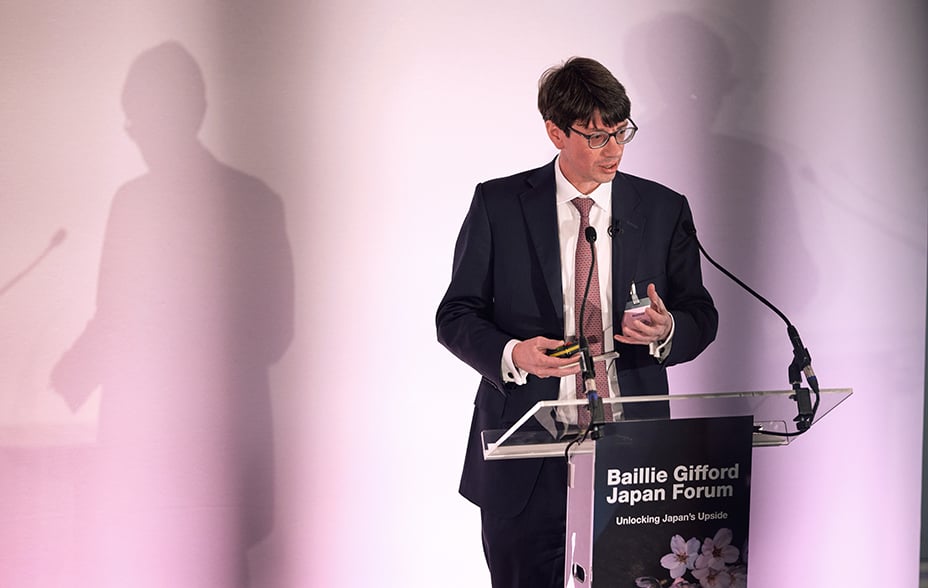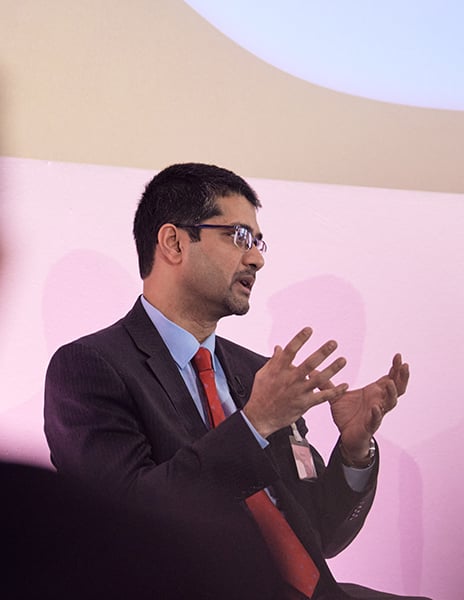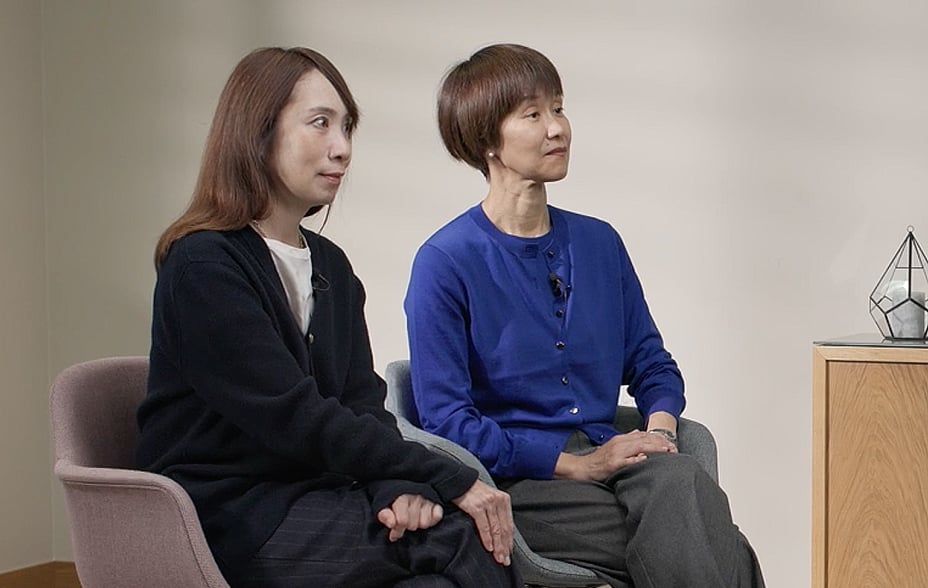Key Points
- The London Investor Forum set out a key task for Baillie Gifford’s Japan Team: to distinguish temporary setbacks from permanent change
- Understanding what makes companies resilient helps to predict long-term success
- Entrepreneurial companies are finding new ways to disrupt established markets

All investment strategies have the potential for profit and loss, capital is at risk. Past performance is not a guide to future returns.
Bedecked with admirals’ portraits and polished maritime memorabilia, Trinity House in the City of London is the venerable headquarters of the General Lighthouse Authority. Whether by accident or design, nautical metaphors featured in Baillie Gifford Japan Forum there on 24 November, entitled ‘Unlocking Japan’s Upside’.
“Setting sail to a destination involves challenges along the way,” explained Matthew Brett, manager of The Baillie Gifford Japan Trust and the firm’s Japanese Fund. “Our general approach is to sail the ship through that volatility.”
Brett compared the temporary setbacks some Japanese companies are facing to storms and rough seas. The far more dangerous rocks and icebergs, he suggested, were irreversible behavioural shifts that can destroy the case for some stocks forever. The goal of the Japan Team, he said, is to “unpick the differences between a temporary setback versus situations where we have to acknowledge that real change has happened”.
Photocopier makers were a good example of the latter. At one stage, the Japanese portfolio held four photocopier stocks. Now the way information is consumed has changed. People carry around digital copies of documents on tablet computers instead of the bulky paper files that Brett recalled lugging around Japan on early trips there. Instead of photocopier stocks such as Canon, the portfolio now holds shares in electrical components maker Murata Manufacturing and Wacom, which produces styluses – electronic pens for use on tablet screens.
Another example of permanent change came from finance, where the competitive advantage of a large branch network has been nullified by the convenience of online banking. Where 10 or 15 years ago, megabanks such as Nomura featured in the portfolio, they have now been replaced by the likes of financial technology firm Rakuten and SBI. “We used to describe SBI as Japan’s leading online brokerage,” Brett pointed out. “Now it’s simply Japan’s leading brokerage.”
While it’s easy to spot those permanent changes with hindsight, his Team’s task is to anticipate them. He highlighted two current trends that they believe represent equally important shifts – energy and transport.
In the field of energy, he singled out the switch from hydrocarbons to renewables. Liquified natural gas is seen as a transition fuel between coal and renewables, which used to earn Inpex – Japan’s largest oil and gas extractor and producer – a place in the portfolio. But now Brett believes Russia’s invasion of Ukraine and the ensuing energy crisis have helped to accelerate a move away from hydrocarbons. Instead, companies that will benefit from electrification, such as Sumitomo Metal Mining, are likely to grow.
In transport, the Team believes traditional Japanese car makers are likely to be left behind by the arrival of cheaper electric vehicles (EVs), especially from China, because many have focused on hybrid cars and others on cars powered by complex hydrogen fuel cells. “At the moment, we think that the Japanese auto assemblers look like they’re very good at making the cars of the near past, but not the future,” added Brett.

Weathering ‘temporary setbacks’
In contrast to stocks facing permanent change within their sectors, Brett highlighted how the market had undervalued companies whose setbacks he believed to be merely temporary. One eye-catching example was gaming giant Nintendo, shares in which plummeted following the unpopularity of its Wii U console in 2012. This reverse, he said, was caused by competition from games on mobile phones. Shares duly recovered, partly thanks to the popularity of its Switch handheld platform launched five years afterwards.
“People were looking at the wrong things when they were looking at the consoles,” Brett explained. “They were looking at the current manifestation of Nintendo’s intellectual property, rather than taking a proper long-term view, which is that Nintendo isn’t actually about those consoles – it’s about the characters, the software, the brands. That’s what made that setback temporary, rather than a permanent change, and allowed growth to return.”
Tyre maker Bridgestone fell into the same category for Brett. He viewed a fall in the company’s operating profits during the Covid-19 lockdowns – when, naturally, fewer vehicles wore out their tyres – as a temporary setback, rather than a permanent change. “The core insight here for us is that the tyre is like a shoe for a car,” he said, pointing out that EVs need tyres as much as traditional cars. “That is what gives us the conviction that we’re experiencing a temporary setback that recovers.”
Cosmetics firm Shiseido also suffered due to Covid-19 but is yet to recover, due to the ongoing restrictions in China. Once China’s growing middle class can travel abroad again, Brett believed they will return to buying cosmetics. The point was reinforced later in the Forum by special guest Masahiko Uotani, Shiseido’s President and CEO.

From ‘resilience’ to ‘resilience-plus’
The panel discussion in the Forum’s final session took up and developed the theme of a company’s resilience in the face of temporary setbacks. The discussion was chaired by Baillie Gifford’s Head of Japanese Equities, Donald Farquharson. It set out to discover the ingredients to an enduring and ‘antifragile’ competitive edge.
“We’ve long understood the basics of a resilient business: one operating in an area of strong repeat demand, with a lowly indebted balance sheet, the ability to self-fund growth, no nasty hidden liabilities on the balance sheet, high margins, and low fixed costs,” Farquharson explained.
“A synonym for static resilience is ‘quality’. We’re trying to look beyond this to ‘resilience-plus’, or a more dynamic competitive advantage.”
One element of shifting from resilience to resilience-plus involves a company increasing its competitive advantage. Tolibjon Tursunov, co-manager of the Japan Growth Strategy, assessed companies’ competitive advantage by looking at internal factors – such as whether they’re investing in research and development or technology – and external factors, such as changes to regulations or customer habits.
He pointed to accountancy software firm freee K.K., which will benefit from changes to regulations that will make it easier to file tax returns online, and Keyence, which began simply by selling sensors but now also analyses data from those sensors and offers advice to its customers.
Praveen Kumar, manager of both Baillie Gifford Shin Nippon Investment Trust and the Baillie Gifford Japanese Smaller Companies Fund, split his definition of resilience into three categories: operational; financial; and managerial. Unique companies that are genuinely disruptive and innovative will come to dominate their chosen market, giving them operational resilience, he said.
Examining financial resilience involves thinking about how the company will look in five years, not how it looks today, Kumar explained. This is especially so if low margins or low returns are due to aggressive investment. Assessing managerial resilience requires looking beyond the founder to the second tier of management, he added.
Kumar shared the example of GA Technologies, which runs a property website that combines selling or renting homes with other services, such as mortgages and cashflow projections for investors, and is using artificial intelligence to disrupt the market. Japan’s real estate sector is heavily regulated, putting up high barriers to entry, while the company, founded in 2013 by former football player Ryo Higuchi, has gone from making sporadic profits to becoming more reliably profitable as it scaled up. Kumar said he was impressed by the calibre of its senior executives.

Management’s vision was also a key factor for environmental, social, and governance (ESG) analyst Cian Whelan, especially when linked to a company’s culture and clear sense of purpose. He pointed to human resources technology firm Recruit, whose entrepreneurial leaders encourage staff to develop and spin out their own businesses, and which develops websites such as Glassdoor that increase transparency by publishing online reviews of what it’s like to work for a particular employer.
Satoko Ishino, one of the Team’s two Tokyo-based company researchers, highlighted the unique business model of television streaming website Abema, in which CyberAgent owns the majority stake. The website can tailor its content in response to events, such as broadcasting emergency information during earthquakes or pay-to-view concerts when singers couldn’t perform in venues during the Covid-19 pandemic.
Ishino added that CyberAgent demonstrated how Japanese management culture was changing. The familiar Japanese phrase “The nail that sticks out gets hammered down” illustrates the peer-pressure dynamic that instils a sense of teamwork among employees and loyalty towards an employer, making it hard sometimes for start-ups to recruit. While CyberAgent has now grown to become a large company, it still retains an adventurous spirit, she explained.
“Japan now has a good balance between that teamwork and job security, and that more adventurous spirit,” Ishino added. “This balance is going to help Japan regain competitiveness in the global economy.” That note of optimism echoed throughout the Forum. It contributed to the sense that Japan’s best companies were steering the correct course, even if we can’t expect plain sailing.
Research consultants Satoko Ishino (left) and Akiko Hirai (right), the Team's eyes and ears in Japan
Local lookouts
For on-the-ground intelligence, the Baillie Gifford Japan Team turns to Satoko Ishino and Akiko Hirai. Forum attendees were introduced to the Tokyo-based pair, who draw on decades of market experience and network-building to bring exciting growth companies to the Team’s attention.
As the eyes and ears of their UK colleagues, Ishino-san and Hirai-san go far beyond the conventional corporate ‘investor relations’ circuit, talking to employees at all levels to inform themselves about a firm’s culture and prospects. Steeped in Japan’s ongoing industrial, regulatory and societal changes, their sources include industrial researchers, trade shows and media reports. All help to inform and challenge Edinburgh-based investors’ perspectives.
Before joining Baillie Gifford, Hirai-san covered a range of Japanese industries for asset managers Schroders and Amundi. Her specialism was large-cap companies, from consumer electronics giants to trading firms.
“At Baillie Gifford we don’t analyse quarterly financial results, we’re more interested in the long-term opportunities arising from bigger changes.” She says. “For a researcher, not being a sector specialist is an advantage as it helps give us a fresh view.”
For Ishino-san, scouting for companies on the right side of change allows her to exercise imagination and critical thinking. Also an ex-Schroders analyst, she has returned to company research after a spell studying cooking in New York.
Two decades of specialising in small and mid-cap companies have tuned her antennae for entrepreneurial leaders capable of growing companies, sometimes by exploiting societal shifts.
“Japan’s old tradition of peer comparison provided strong job security and teamwork. Now new industries grow up quickly and existing companies need rapid change, so we’re looking for strong, visionary leadership”.
Risk factors
The views expressed should not be considered as advice or a recommendation to buy, sell or hold a particular investment. They reflect opinion and should not be taken as statements of fact nor should any reliance be placed on them when making investment decisions.
This communication was produced and approved in January 2023 and has not been updated subsequently. It represents views held at the time of writing and may not reflect current thinking.
This communication contains information on investments which does not constitute independent research. Accordingly, it is not subject to the protections afforded to independent research, but is classified as advertising under Art 68 of the Financial Services Act (‘FinSA’) and Baillie Gifford and its staff may have dealt in the investments concerned.
All information is sourced from Baillie Gifford & Co and is current unless otherwise stated.
The images used in this communication are for illustrative purposes only.
Important information
Baillie Gifford & Co and Baillie Gifford & Co Limited are authorised and regulated by the Financial Conduct Authority (FCA). Baillie Gifford & Co Limited is an Authorised Corporate Director of OEICs.
Baillie Gifford Overseas Limited provides investment management and advisory services to non-UK Professional/Institutional clients only. Baillie Gifford Overseas Limited is wholly owned by Baillie Gifford & Co. Baillie Gifford & Co and Baillie Gifford Overseas Limited are authorised and regulated by the FCA in the UK.
Persons resident or domiciled outside the UK should consult with their professional advisers as to whether they require any governmental or other consents in order to enable them to invest, and with their tax advisers for advice relevant to their own particular circumstances.
Financial intermediaries
This communication is suitable for use of financial intermediaries. Financial intermediaries are solely responsible for any further distribution and Baillie Gifford takes no responsibility for the reliance on this document by any other person who did not receive this document directly from Baillie Gifford.
Europe
Baillie Gifford Investment Management (Europe) Limited provides investment management and advisory services to European (excluding UK) clients. It was incorporated in Ireland in May 2018. Baillie Gifford Investment Management (Europe) Limited is authorised by the Central Bank of Ireland as an AIFM under the AIFM Regulations and as a UCITS management company under the UCITS Regulation. Baillie Gifford Investment Management (Europe) Limited is also authorised in accordance with Regulation 7 of the AIFM Regulations, to provide management of portfolios of investments, including Individual Portfolio Management (‘IPM’) and Non-Core Services. Baillie Gifford Investment Management (Europe) Limited has been appointed as UCITS management company to the following UCITS umbrella company; Baillie Gifford Worldwide Funds plc. Through passporting it has established Baillie Gifford Investment Management (Europe) Limited (Frankfurt Branch) to market its investment management and advisory services and distribute Baillie Gifford Worldwide Funds plc in Germany. Similarly, it has established Baillie Gifford Investment Management (Europe) Limited (Amsterdam Branch) to market its investment management and advisory services and distribute Baillie Gifford Worldwide Funds plc in The Netherlands. Baillie Gifford Investment Management (Europe) Limited also has a representative office in Zurich, Switzerland pursuant to Art. 58 of the Federal Act on Financial Institutions (‘FinIA’). The representative office is authorised by the Swiss Financial Market Supervisory Authority (FINMA). The representative office does not constitute a branch and therefore does not have authority to commit Baillie Gifford Investment Management (Europe) Limited. Baillie Gifford Investment Management (Europe) Limited is a wholly owned subsidiary of Baillie Gifford Overseas Limited, which is wholly owned by Baillie Gifford & Co. Baillie Gifford Overseas Limited and Baillie Gifford & Co are authorised and regulated in the UK by the Financial Conduct Authority.
Hong Kong
Baillie Gifford Asia (Hong Kong) Limited 柏基亞洲(香港)有限公司 is wholly owned by Baillie Gifford Overseas Limited and holds a Type 1 and a Type 2 license from the Securities & Futures Commission of Hong Kong to market and distribute Baillie Gifford’s range of collective investment schemes to professional investors in Hong Kong. Baillie Gifford Asia (Hong Kong) Limited 柏基亞洲(香港)有限公司 can be contacted at Suites 2713–2715, Two International Finance Centre, 8 Finance Street, Central, Hong Kong. Telephone +852 3756 5700.
South Korea
Baillie Gifford Overseas Limited is licensed with the Financial Services Commission in South Korea as a cross border Discretionary Investment Manager and Non-discretionary Investment Adviser.
Japan
Mitsubishi UFJ Baillie Gifford Asset Management Limited (‘MUBGAM’) is a joint venture company between Mitsubishi UFJ Trust & Banking Corporation and Baillie Gifford Overseas Limited. MUBGAM is authorised and regulated by the Financial Conduct Authority.
Australia
Baillie Gifford Overseas Limited (ARBN 118 567 178) is registered as a foreign company under the Corporations Act 2001 (Cth) and holds Foreign Australian Financial Services Licence No 528911. This material is provided to you on the basis that you are a ‘wholesale client’ within the meaning of section 761G of the Corporations Act 2001 (Cth) (‘Corporations Act’). Please advise Baillie Gifford Overseas Limited immediately if you are not a wholesale client. In no circumstances may this material be made available to a ‘retail client’ within the meaning of section 761G of the Corporations Act.
This material contains general information only. It does not take into account any person’s objectives, financial situation or needs.
South Africa
Baillie Gifford Overseas Limited is registered as a Foreign Financial Services Provider with the Financial Sector Conduct Authority in South Africa.
North America
Baillie Gifford International LLC is wholly owned by Baillie Gifford Overseas Limited; it was formed in Delaware in 2005 and is registered with the SEC. It is the legal entity through which Baillie Gifford Overseas Limited provides client service and marketing functions in North America. Baillie Gifford Overseas Limited is registered with the SEC in the United States of America.
The Manager is not resident in Canada, its head office and principal place of business is in Edinburgh, Scotland. Baillie Gifford Overseas Limited is regulated in Canada as a portfolio manager and exempt market dealer with the Ontario Securities Commission (‘OSC’). Its portfolio manager licence is currently passported into Alberta, Quebec, Saskatchewan, Manitoba and Newfoundland & Labrador whereas the exempt market dealer licence is passported across all Canadian provinces and territories. Baillie Gifford International LLC is regulated by the OSC as an exempt market and its licence is passported across all Canadian provinces and territories. Baillie Gifford Investment Management (Europe) Limited (‘BGE’) relies on the International Investment Fund Manager Exemption in the provinces of Ontario and Quebec.
Israel
Baillie Gifford Overseas is not licensed under Israel’s Regulation of Investment Advising, Investment Marketing and Portfolio Management Law, 5755–1995 (the Advice Law) and does not carry insurance pursuant to the Advice Law. This material is only intended for those categories of Israeli residents who are qualified clients listed on the First Addendum to the Advice Law.
Ref: 28950 10017604




